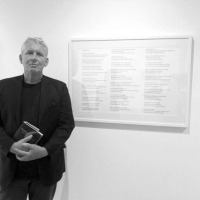
Author Tracy Farr, photo: Liane McGee
Tracy Farr’s debut novel The Life and Loves of Lena Gaunt featured in the October soiree of Friday Night Fictions. Dame Lena Gaunt is in her 80s. She takes gentle doses of heroin, she swings between men and women as lovers and confidantes, she moves with the times via Perth, Sydney, various parts of Asia and New Zealand, all the while dreaming of her electrified passion: the theremin (see Clara Rockmore playing it).
As Lena raises her fingers and moves her body, Farr’s lyrical and elegant prose places us in the picture — an audience for memories and music — as Lena negotiates a documentary crew keen to capture a look-back at her life. The idea of documentary sets up a dynamic tension between what Lena wants to reveal, and what actually happened to her. She occasionally hides behind the persona of a vague elderly lady, all the while sorting out just who she can trust.
I’m always drawn to writers who pack an emotional punch by holding things back. Jon Bauer does it well. Jo Case and Annabel Smith too. It’s something I aim for in my writing: to not tell readers what to feel, but to hope they feel it deeply anyway.
It’s exciting to read a debut novelist as exciting as Farr, as she has a career set in writing novels. Her fiction is strong and unique. She is about to head (from Wellington in NZ) to Perth for the writers’ festival. I spoke to her about how to capture a long life in fiction.
Do you remember the moment when you decided you wanted to be a writer?
I don’t remember one moment. The ‘want’ was there from a young age. I wrote mostly songs and narrative poems when I was a kid, and I always kept journals and notebooks for scribbling and sketching. It wasn’t until I was in my late twenties that I started trying to write stories, though. Even then, I was tentative and unsure about my abilities. I was slow to come out of the author-closet and declare myself even a wanna-be writer.
What inspired you to set out on the long road to writing a novel?
 There are several unfinished novels in the bottom drawer; Lena wasn’t my first attempt at writing a novel, just the first one that was worth finishing. When I first started trying to write fiction, it was writing a novel that I had in mind — or a novella, in the vein of Brenda Walker’s Crush and One More River. But I just didn’t have the staying power — I’d get ten or twenty thousand words in, even forty thousand, then hit a big wall. I pulled back; I wondered if I could somehow develop my writing muscles by writing short stories, and that seemed to work for me. The novel and short story are very different forms, but I needed to learn how to write by learning to write short stories. Once I had the idea for Lena Gaunt, I realised I could trick myself into writing that novel by thinking of it as a series of related short stories. I’ve learnt enough through the process of writing this novel that I haven’t felt the need to trick myself into the next novel in the same way.
There are several unfinished novels in the bottom drawer; Lena wasn’t my first attempt at writing a novel, just the first one that was worth finishing. When I first started trying to write fiction, it was writing a novel that I had in mind — or a novella, in the vein of Brenda Walker’s Crush and One More River. But I just didn’t have the staying power — I’d get ten or twenty thousand words in, even forty thousand, then hit a big wall. I pulled back; I wondered if I could somehow develop my writing muscles by writing short stories, and that seemed to work for me. The novel and short story are very different forms, but I needed to learn how to write by learning to write short stories. Once I had the idea for Lena Gaunt, I realised I could trick myself into writing that novel by thinking of it as a series of related short stories. I’ve learnt enough through the process of writing this novel that I haven’t felt the need to trick myself into the next novel in the same way.
What is it that you love most about writing?
Moving words around until they start to sing; inventing other lives; surprising myself; shutting myself away and (literally or metaphorically) curving my arm around the page to write and write and write and perfect before letting the words out to the world.
I love what comes after the writing, too; that once my novel is out in the world, what I intended as its meaning is irrelevant — it comes down to what the text says to a reader, and how the reader receives it. I love the idea that there are readings of the book that I haven’t foreseen (or consciously invited, or intended), and that it has a life beyond and without me.
What do you put off doing when you sit down at your desk?
Housework (happily). Gardening (wistfully). Socialising (guiltily). Television/DVDs (smugly). Reading (mournfully).
How did you go about getting the book published?
It was a long, long road. When I finished the first polished draft of the novel, I didn’t — I still don’t — have an agent and I knew that, without one, I needed to rely on my contacts, and/or submit it to the few publishers that will still accept unsolicited manuscripts directly from authors. Several of the publishers I fancied fell within that set, so I thought I’d give it a go without an agent.
So I sent that finished, but early, draft of the novel to a New Zealand publisher who I’d been in touch with over the years, and who’d been keen to see a novel from me. They knocked it back. I was devastated, even though I’d been pretty sure that the novel I’d written wasn’t the novel they were looking for from me, and even though I knew the novel needed more work, and wasn’t yet the best it could be. In that devastated, desolate, rejected state, I fired the MS off in a mad hurry — as it was, still needing work — to the slush pile of an Australian publisher. That rejection, when it came, hurt less. I pulled my head in, paused, took a breath.
I worked for a solid six months on a major revision, overhauled the MS, took in comments from my wonderful early readers, then sent the much-improved MS, unsolicited, to Fremantle Press. Fremantle Press was always in my sights as a natural home for the novel, particularly because the story was so strongly grounded in place, and that place was Cottesloe Beach, near where I grew up in Perth. It was nearly six months after sending them the MS that I received the news that they were keen, but thought it still needed work; would I consider working with them to revise the MS? Yes, I would. We worked back and forth for nearly eighteen months — slowly, but as fast as their schedule and mine allowed — on the MS before, in June 2012, we signed the contract to publish.
Your writing moves between Perth, Sydney, New Zealand, and various parts of Asia. How did you go about researching and recreating these very different parts of the world?
I’m originally from Perth, I lived there until I was nearly 30. I left Perth in 1991, the year the contemporary part of the novel is set, so Perth in 1991 is very real, very specific to me, sort of set in amber — a time before mobile phones and the internet, before we were all connected. When I started writing the novel I was living for a month in Perth, up in the hills at Katharine Susannah Pritchard Writers’ Centre as Writer in Residence, and I’d catch the bus and the train and the bus to Cottesloe and walk around and breathe the air, watch the light, listen to the streets, when I needed to remind myself of the setting.
I’ve spent time in most of the places the novel is set in. The sections of the novel that are set in Sydney I originally set in New York, where the theremin was actually invented in the 1920s. But I only knew New York from movies and, more importantly, I wanted to move firmly away from the ‘real’ characters — Leon Theremin, Clara Rockmore — who had inspired my characters and their story, and move them closer to what was home for Lena. It was only when I started rewriting scenes from their New York setting that I realised the gift that a move to Sydney in the timeframe of that section would give me: Sydney Harbour Bridge under construction. I layered research on Sydney in the 1920s and early 1930s with my own memories of a long summer spent in Sydney at the age of 16 (about Lena’s age when she arrives there).
I had fantastic resources to draw on for the sections of the novel set in (and travelling to) Singapore and Malacca. My paternal grandmother shares with the fictional Lena Gaunt a birth place and year (Singapore, 1910), childhood in Singapore and Malacca, and jaunts back to boarding school in Perth, and in writing Lena’s story I leaned heavily on stories my grandmother told me over the years, as well as written resources from her father, my great-grandfather. I was able to overlay their experience of South-East Asia early in the twentieth century with mine of the same places sixty or seventy years later.
In all of these very specific settings, though, I wasn’t aiming for strict historical realism. I was seeking to create a version of each time and place that was intensely believable within the context of the novel, yet was — filtered through Lena’s eyes and experiences — slightly off-true, off-kilter.
The novel shifts from historical to contemporary fiction as you trace Lena’s life. How difficult was it to structure this so it moves seamlessly?
That was one of the biggest challenges in the revision process. I wrote the contemporary sections quite separately from the historical sections, and I wrote each of those historical sections quite separately from the other historical sections. There was also a whole other part of the novel in earlier drafts — it didn’t make it in the final cut — in the voice of the filmmaker character, Mo Patterson, and stretching forward in time to the 2010s. I worked hard, through revisions, on the relative weights (in word length as well as emotional weight) of the sections, and on where and how to interleave the contemporary sections with the historical sections. I found it really interesting that in the final structural revision — a really fantastic process of tightening and fine-tuning, and the murder of a few darlings — some of the most effective changes were those that shifted a paragraph or even a whole chapter, say from the end of one section to the start of the next; it was unpicking the endpoints that were artefacts from my writing process. Working collegially with my editors was a really pleasant and unexpectedly energising part of the publishing process; I had great editors, and I always felt as if my book and I were in safe hands.
With your lyrical prose, you beautifully capture the magic of the theremin. When did you come up with the idea of Lena playing this mesmerising instrument and was the character based on an existing figure?
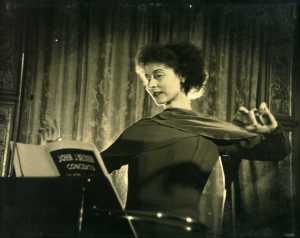
Lucie Rosen and the theremin, Caramoor Centre for Music and the Arts
I’d first seen the theremin played live when I went to see the band Pere Ubu in Vancouver in the mid-90s. Mesmerising is just the word; I couldn’t take my eyes off it. It was more than ten years later that I watched the documentary Theremin: An Electronic Odyssey. The film — a history of this bizarre musical instrument and its inventor, Lev Termen (usually anglicised as Leon Theremin) — was where I encountered Clara Rockmore, the first virtuoso player of the theremin. About that time, I’d started writing notes, circling around a character I wanted to write about, a musician. I knew, when I watched that film, that I’d found Lena’s instrument — an instrument you play without touching was perfect. But I knew I didn’t want to base my character, Lena, strictly on Clara, so I more or less stopped my research then and there. Film and still images of Clara — from a young girl to an old woman — in the documentary gave me some really strong visual cues for Lena. I started with a lot of notes based on my recollection of the film, then as I developed the character, I aimed to distance myself and Lena from the film and from real life events. Clara Rockmore was a starting point for Lena, rather than a model.
Do you have a writing community where you live? Do you like the company of other writers when working on drafts, or are you someone who prefers to go it alone?
Wellington has a really strong community of writers and people who care about writing and books. We have the International Institute of Modern Letters at Victoria University, and writing courses at Whitireia and Massey University; New Zealand Book Council is based in Wellington, and we have an active local branch of the NZ Society of Authors. There’s always something happening.
That said, my tendency is to be a loner; but there are times when the input and company of others has been hugely helpful. I’ve been part of writing groups at various times, mostly arising from workshops or classes I’ve taken. Being able to sit in that classroom or living room or cafe, to swap writing, to give and take criticism and comment, is a great thing. But I do find that the more my time is squeezed and limited and precious, the more likely I am to just shut the door on everyone else and write, by myself. It’s much later in the process that I seek the company of others.
What is the most important thing you’ve learned in the process of writing your first novel, that you wish you knew at the beginning?
Be patient. The process takes a long time. Don’t rush. Find a great editor/editors, and trust her/them.
Which authors have been instrumental to your own reading and writing?
My first loves were my parents’ books from their childhoods: A.A. Milne in my dad’s precious editions from the 1940s; Enid Blyton from Mum. As a teenager, I read widely — I spent a lot of time in the school and public libraries — but developed obsessions with authors who I’d focus in on at different times: science fiction writers (Arthur C. Clarke, Asimov, John Wyndham, Ray Bradbury); the murder mysteries of Agatha Christie (after an earlier diet of Trixie Belden, Nancy Drew, Famous Five, Secret Seven et al.); an assorted bunch of American writers (J.D. Salinger, Paul Zindel, Sylvia Plath, John Steinbeck, Richard Brautigan); the short stories of Katherine Mansfield.
By the time — years later, in my late twenties — I was starting to try to work out how I might write, I was reading and inspired by Helen Garner, Beverley Farmer, Brenda Walker, Elizabeth Jolley, Peter Carey, Tim Winton; Patrick White, too. I was in love with Australian writing. I was in love with women writers: Virginia Woolf, Jeanette Winterson, Angela Carter, A.S. Byatt. I somehow didn’t discover Alice Munro and Carol Shields until I lived in Canada — they joined my pantheon. Men got a look-in too: Martin Amis, Ian McEwan, Julian Barnes, Jim Crace. Moving to New Zealand in the mid-90s, I was struck most by the poetry that runs through this country’s literature (poetry and prose) — Elizabeth Smither, Jenny Bornholdt, Bill Manhire, Sarah Quigley, Fiona Kidman, Damien Wilkins, Ian Wedde.
This is a very white, very anglo list, I know. But the writers who have influenced me most have been overwhelmingly white, writing in English from the mid- to late-twentieth century onwards.
My reading (I’ve resisted the silly urge to qualify and diminish this with ‘for pleasure’; all of my fiction reading is for pleasure) always circles back to one early obsession: murder mysteries and thrillers. I return again and again to Ian Rankin, Val McDermid, Peter Temple (a recent discovery), Ruth Rendell, P.D. James, John Le Carré, Henning Mankell; I find strange comfort in reading and re-reading Lee Child’s Jack Reacher novels. One of my early, unfinished novel MS is a murder mystery; I still fancy writing one, one day.
Your central character, Lena, lives into her 80s. How do you see yourself when you reach this age?
I look to my grandmothers. I was thinking a lot about them when I wrote this novel, and I dedicated it to them. At eighty, both of them were feisty, active, interesting, stroppy, interested, full of life and opinions. I hope I’m the same. I see myself as a kick-arse crone.
For more about Tracy Farr, or her debut novel, visit her website.
Each month I choose a debut author to profile from Friday Night Fictions. Read interviews with Michael Adams and Nina Smith. Next up is Laura Jean McKay, writer of the short story collection, Holiday in Cambodia — from the November soiree.
WHAT ABOUT YOU, DEAR READER? HOW WOULD YOU LIKE TO BE WHEN YOU TURN 80? OR ARE YOU ALREADY THERE AND CAN OFFER SOME ADVICE?
Posted in
Australian Women Writers,
Book Reviews,
Debut authors,
Friday Night Fictions,
Novels,
Writers + Writing and tagged
australian women writers,
clara rockmore,
debut author,
first novel,
friday night fictions,
life and loves of lena gaunt,
theremin,
tracy farr

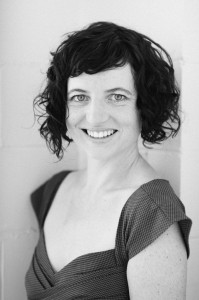




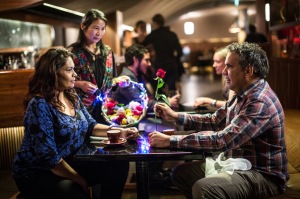
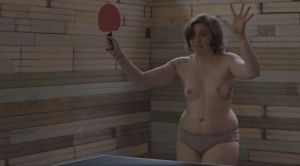



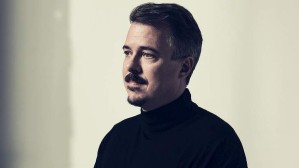
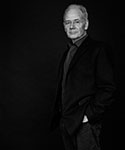




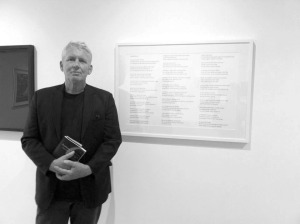


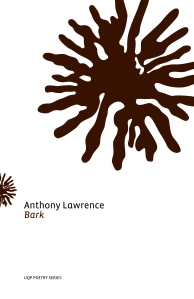

 Tim Ferguson may want to throw off the shackles of being a Doug Anthony All Star but I’m not going to let him. I’m 18. It’s New Year’s Eve. It’s late. It might even be midnight. I’m feeling like I’ve taken an E but the rave scene is yet to come. I’m screaming like those girls at the Beatles. I’m in the audience for the Doug Anthony All Stars and a girl in doc martens is chasing Paul McDermott around the stage like she’s going to eat him alive. She is fast but he is faster. They are both completely desperate. I want to be her.
Tim Ferguson may want to throw off the shackles of being a Doug Anthony All Star but I’m not going to let him. I’m 18. It’s New Year’s Eve. It’s late. It might even be midnight. I’m feeling like I’ve taken an E but the rave scene is yet to come. I’m screaming like those girls at the Beatles. I’m in the audience for the Doug Anthony All Stars and a girl in doc martens is chasing Paul McDermott around the stage like she’s going to eat him alive. She is fast but he is faster. They are both completely desperate. I want to be her.

 A stunning new voice reminiscent of Maggie O’Farrell, which has been acclaimed by John Banville, Sebastian Barry, Roddy Doyle and Anne Enright. Unabridged edition, written and read by Michele Forbes.
A stunning new voice reminiscent of Maggie O’Farrell, which has been acclaimed by John Banville, Sebastian Barry, Roddy Doyle and Anne Enright. Unabridged edition, written and read by Michele Forbes. The Persuasion of Miss Jane Brody is set in Regency England. Jane Brody is a passionate follower of Mary Wollstonecraft’s beliefs in the rights of women. She campaigns for better education and employment opportunities for girls so they can be independent of men.
The Persuasion of Miss Jane Brody is set in Regency England. Jane Brody is a passionate follower of Mary Wollstonecraft’s beliefs in the rights of women. She campaigns for better education and employment opportunities for girls so they can be independent of men. Millie has decided that this will be her year for a relationship and when she meets sexy plumber Adam things start to look up, until he dumps her after what she thought was a fabulous date.
Millie has decided that this will be her year for a relationship and when she meets sexy plumber Adam things start to look up, until he dumps her after what she thought was a fabulous date. Layla is only 14. She cruises online. She catches trains to meet strangers. Her mother, Margot, never suspects. Even when Layla brings a man into their home.
Layla is only 14. She cruises online. She catches trains to meet strangers. Her mother, Margot, never suspects. Even when Layla brings a man into their home.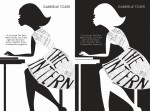 “Melons. The girls. Gazongas. I could rattle off every nickname in the world for my boobs — oops, nearly forgot jubblies — but it didn’t change the fact they were small. Embarrassingly small. Think grapes over melons, fun-size bags over fun bags, shot glasses over jugs.
“Melons. The girls. Gazongas. I could rattle off every nickname in the world for my boobs — oops, nearly forgot jubblies — but it didn’t change the fact they were small. Embarrassingly small. Think grapes over melons, fun-size bags over fun bags, shot glasses over jugs. Lawson is sent overseas to retrieve three paintings for a Kurt Von Honningsberg exhibition.
Lawson is sent overseas to retrieve three paintings for a Kurt Von Honningsberg exhibition.
 There are several unfinished novels in the bottom drawer; Lena wasn’t my first attempt at writing a novel, just the first one that was worth finishing. When I first started trying to write fiction, it was writing a novel that I had in mind — or a novella, in the vein of Brenda Walker’s Crush and One More River. But I just didn’t have the staying power — I’d get ten or twenty thousand words in, even forty thousand, then hit a big wall. I pulled back; I wondered if I could somehow develop my writing muscles by writing short stories, and that seemed to work for me. The novel and short story are very different forms, but I needed to learn how to write by learning to write short stories. Once I had the idea for Lena Gaunt, I realised I could trick myself into writing that novel by thinking of it as a series of related short stories. I’ve learnt enough through the process of writing this novel that I haven’t felt the need to trick myself into the next novel in the same way.
There are several unfinished novels in the bottom drawer; Lena wasn’t my first attempt at writing a novel, just the first one that was worth finishing. When I first started trying to write fiction, it was writing a novel that I had in mind — or a novella, in the vein of Brenda Walker’s Crush and One More River. But I just didn’t have the staying power — I’d get ten or twenty thousand words in, even forty thousand, then hit a big wall. I pulled back; I wondered if I could somehow develop my writing muscles by writing short stories, and that seemed to work for me. The novel and short story are very different forms, but I needed to learn how to write by learning to write short stories. Once I had the idea for Lena Gaunt, I realised I could trick myself into writing that novel by thinking of it as a series of related short stories. I’ve learnt enough through the process of writing this novel that I haven’t felt the need to trick myself into the next novel in the same way.

